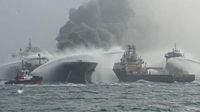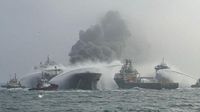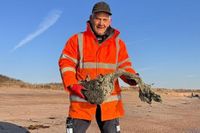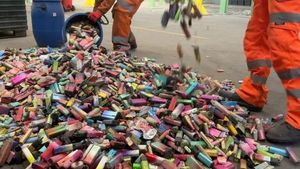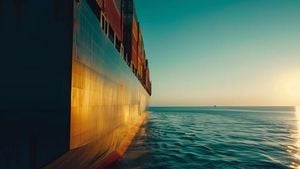The small coastal town of Skegness is currently grappling with the aftermath of a major environmental incident involving debris from a cargo ship collision in the North Sea. Until early this week, the debris was primarily concentrated on the North Norfolk coast, as reported by the Lincolnshire Wildlife Trust. However, the situation escalated on Monday night, March 17, 2025, when plastics pellets, known as nurdles, were first reported at around 6:30 PM along Skegness’ beaches. Nurdles are small plastic pellets often used in the manufacturing of plastic goods, and they pose a potential risk to marine life due to their resemblance to food sources.
By Tuesday morning, March 18, locals noted a distressing scene along South Beach towards Gibraltar Point; the shore was littered with clumps of burned material, including the plastic nurdles. Derrick Whitworth from East Lindsey District Council's Street Scene reported, “It’s a very sad sight to see. It almost looks like coral but what it is is thousands of pellets that look like eggs almost.” He further expressed concern about the environmental damage, highlighting that these pellets could easily be mistaken for food by fish. “While we can clean stuff off the beach, the damage it's going to do to the environment and the water is frightening,” Whitworth added.
Alongside the nurdles, a dead bird was found washed ashore, raising concerns about the impact of the pollution on local wildlife. “The Environment Agency has advised that these nurdles are not hazardous so the risk to the public is low,” stated the Lincolnshire Resilience Forum, advising caution for pet owners, especially dog walkers, to keep their animals away from the pellets to avoid ingestion.
Local authorities are actively responding to the crisis; the Environment Agency confirmed the risk to public health remains minimal despite the unpleasant smell that may emanate from the nurdles. However, this assurance does little to quell the concerns of local residents and environmental advocates. “When you look out to sea it’s gorgeous,” Whitworth noted, “but when you think about what’s in that water right now and the damage it’s doing, it’s frightening.”
Following the collision that released the nurdles, various local agencies have begun collaborative cleanup efforts. Craig Leyland, the leader of the East Lindsey District Council, shared during a press briefing on March 19, “We are aware of various reports of plastic pellets being washed up on some of our beaches and coastline overnight and this morning. We are working closely with other agencies and organizations to ensure we clean these up as soon as we can.” Leyland expressed concern over how the debris might impact “public health, the marine habitat, our beaches, and local wildlife.”
The incident stems from a catastrophic collision involving a cargo ship and an oil tanker, which took place within the North Sea. The HM Coastguard confirmed that on March 17, the RNLI Skegness and Mablethorpe crews engaged in a critical rescue operation, successfully bringing 36 individuals to Grimsby port. Reportedly, one crew member from the cargo vessel is presumed dead, and a 59-year-old Russian captain has been arrested on suspicion of gross negligence manslaughter.
Initially feared to be carrying 15 containers of the toxic chemical sodium cyanide, the cargo ship was confirmed to have been transporting jet fuel for the US government. Some of this fuel subsequently spilled into the North Sea, raising alarms about potential environmental ramifications. Leyland emphasized that the Humber Local Resilience Forum is engaged in a robust response to the incident, which includes coordinated efforts from various agencies across Lincolnshire.
As concerns mount over the implications of this ecological disaster, local environmental organizations, including the Lincolnshire Wildlife Trust, have highlighted the risks posed by pollution to the Lincolnshire Coronation Coast National Nature Reserve. This area, designated by King Charles III in 2023, is known for its vital populations of seabirds and seals. “The area is home to internationally important populations of seabirds and seals,” the Trust stated, urging the public to report nurdles or pollution encountered along the coast.
If citizens discover any nurdles or any signs of pollution, they are encouraged to contact the Humber Maritime Rescue Coordination Centre at 0344 382 0580 or via email at more [email protected]. Residents are asked to provide accurate location details, such as a what3words location or a grid reference, to help the Coastguard address the situation effectively. Emergencies should be reported to authorities by calling 999.
As the cleanup continues, local officials and volunteers remain vigilant, hoping to restore the beauty of Skegness' beaches while mitigating the damage caused by this unfortunate incident. The outreach from local government and environmental bodies reflects a concerted effort to address the disaster and its repercussions on wildlife and the coastal environment.
